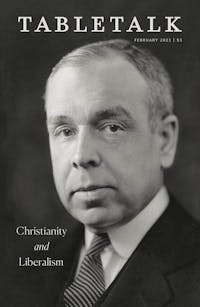
Request your free, three-month trial to Tabletalk magazine. You’ll receive the print issue monthly and gain immediate digital access to decades of archives. This trial is risk-free. No credit card required.
Try Tabletalk NowAlready receive Tabletalk magazine every month?
Verify your email address to gain unlimited access.
Many christians have experienced anxiety as they have asked themselves, “When should I leave my church?” It’s an important question that involves many factors. Simply put, there is no easy comprehensive answer. But I hope to outline some of the considerations of the question in this article.
Defining what it means to leave a church is helpful for this discussion. One of the assumptions made in this article is that church membership is biblical and necessary for Christians. There isn’t space here to make the argument for the necessity of church membership, but suffice it to say that if you don’t join a church, you can’t really leave it. So assuming a proper biblical church polity, there are only three ways that a Christian can leave a church: death, excommunication, and transfer of membership. This article won’t address death or excommunication. By “leaving the church,” I mean transferring your membership to another church. When is it appropriate to do so?
The shortest answer is that unless you have moved to a location where it is impractical to continue your membership, you should not leave a true church. There are always qualifiers, exceptions, and circumstances that prevent this from being the easy comprehensive answer. Yet the basic principle stands; ordinarily, you should not leave a true church. But if your local church fails at the basic marks of a true church, then you ought to consider leaving.
The Belgic Confession helps us discern legitimate reasons for leaving a church by outlining the marks of a true church:
The marks, by which the true Church is known, are these: if the pure doctrine of the gospel is preached therein; if she maintains the pure administration of the sacraments as instituted by Christ; if church discipline is exercised. (Article 29)
The true church is marked by pure doctrine, pure administration of the sacraments, and church discipline. These provide Christians with three fundamental points to evaluate whether they should stay or go.
We must acknowledge that on this side of eternity there is no church that is completely free of all errors because there is no fellowship of Christians untouched by sin. The Westminster Confession of Faith reminds us, “The purest churches under heaven are subject both to mixture and error” (25.5). The decision to leave a church should not be based on whether a church is perfect because there are no perfect churches.
While we cannot hold churches to the standard of perfection, it is legitimate to acknowledge that churches do at times descend into errors that strike at the vitals of the church. A church ought to teach and preach in accordance with its stated confessional standard, whether it be Westminster, the Three Forms of Unity, the 1689 London Baptist Confession, or some other confessional statement that the scrutiny of history has determined to be faithful to Scripture. A lack of confessional standards makes it nearly impossible to determine whether a church is remaining faithful to its theological convictions. Nearly every Christian heretic has responded to criticism by saying, “I’m only teaching what the Bible really says!” A robust and tested confession stands as a faithful standard by which a church’s teaching can be judged. Is this particular church faithful to teach according to what it says is true? If the church ceases to preach pure doctrine, it is time to leave.
To be clear, we do not expect perfection from a church’s teaching and preaching. A pastor who occasionally misstates something or makes a mistake in his teaching needs to be encouraged by his church, not abandoned. Do not leave a church because your pastor isn’t perfect. But a pastor or elder who consistently contradicts his confessional standards creates a serious problem. Your first response is to humbly address this with the elders and then denominational structures of accountability. If these leaders are not able to give a sufficient answer, then perhaps it is time to leave. A similar standard ought to be applied with respect to the proper administration of the sacraments.
Perhaps it is not the church but your theological convictions that have changed. You should determine whether this change is so significant as to cause continual friction in your fellowship. If it is fairly insignificant, then simply overlook the difference. If it is a significant change, however, you ought to meet with your elders and humbly share your change. You should approach that meeting with every intention of being convinced that your new views are wrong. You should submit to your authorities in the Lord. But if you remain convinced by Scripture in your change of view, then you should respectfully request a transfer to a faithful church that is in line with your views. And you should freely acknowledge that your previous church was faithful in teaching what it said it would teach. Leaving under these circumstances is no reason to denigrate your previous church.
Perhaps there is no problem with the teaching of the Word, administration of the sacraments, or exercise of discipline in the church. Perhaps you simply feel that you don’t get anything out of church, and there is a very engaging and dynamic new church down the road. Perhaps, you think, this would get my family more involved in church. If this is your situation, you need to acknowledge that the problem may not be the church but you. You might be approaching the church as a consumer of goods, not as a worshiper of God. If it feels as if your “needs” are not being met in a true church, it may very well be that you are concerned with satisfying the wrong “needs.”
